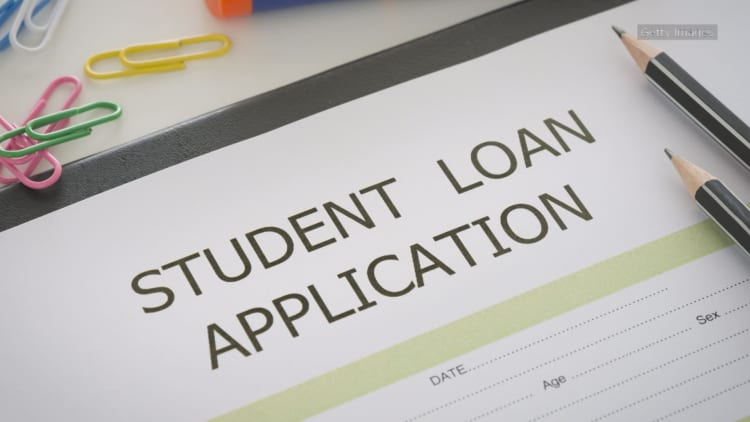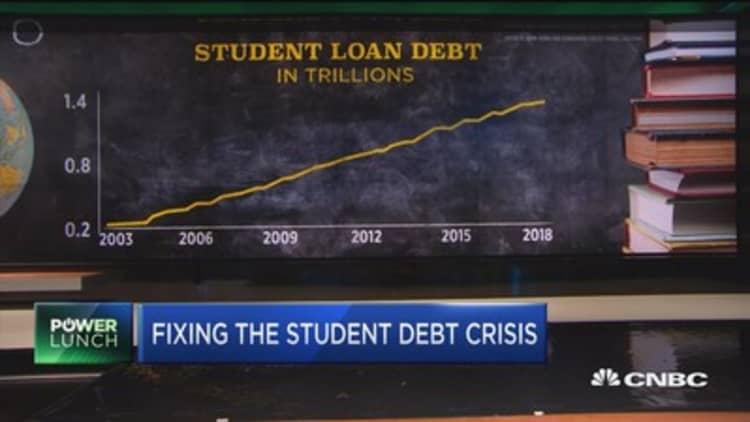
Denise Sparks graduated from college in 1995 with $30,000 in debt. Then her life turned challenging.
First, there was the divorce from her husband, which left her to raise two children on her own. Then she fell ill and had multiple operations. Along the way, a psychiatrist diagnosed her with depression, bipolar and post-traumatic stress disorder.
She often missed work and didn't have enough money to send in her student loan payments. Today her debt, with interest, penalties and fees, is more than $230,000.
"I can't plan for retirement," Sparks, 53, said. "I'll die before this could ever get paid back."
Sparks reached out to a number of lawyers where she lives in Phoenix about filing for bankruptcy, but to no avail.
"One attorney just cut me off," she said. "He didn't want anything to do with it."
That's likely in part because federal laws don't allow student loans to be discharged in bankruptcy unless the borrower can prove that the debt poses an "undue hardship." That term may sound relatively benign, but legally it's a high bar to meet: Borrowers often must exhibit a "certainty of hopelessness."
A recent development has made Sparks feel a little less hopeless.
She discovered, thanks to a post in a Facebook group, Student Loan Justice, that the Education Department was requesting public feedback on whether it's too difficult for Americans to erase their student debt in bankruptcy, signaling it may consider making the process easier.
Comments from student loan borrowers poured in.
"My sadness stems from a hopeless circumstance of federal student loan debt that I have been living with for two decades," wrote John Koch. "The principal balance has quintupled from what it originally was and is now about $450,000 and still growing."
The request for public comment prompted some advocates and experts who've been following the issue to do a double take.
"I was frankly surprised," said John Rao, a lawyer with the National Consumer Law Center. "This administration has not been very consumer friendly."
Indeed, the Trump administration has taken moves that advocates describe as favoring the student loan industry over its borrowers.
Yet a change in bankruptcy rules could be in the interest of the student loan industry as well, said Ed Boltz, vice president of the National Association of Consumer Bankruptcy Attorneys.
That's because the Education Department often requires that servicers of federal student loans like Navient oppose petitions for bankruptcy by student loan borrowers — even if the prospects of recovering that debt are dim, Boltz said.

In many cases, "they know they're never going to get a penny, but they're forced to go through with it," he said.
That dynamic could explain why Navient, one of the country's largest loan servicers, has lobbied for the government to allow private and federal loans to be discharged in bankruptcy.
I'll die before this could ever get paid back.Denise SparksStudent loan borrower
The notice signaled that the department was likely considering leaving more room for servicers of student loans not to contest certain claims, Boltz said.
"It's likely they're looking and saying, 'This is a debt we'll never collect'," he said. "'Why are we chasing it?'"
To be sure, some people argue that it's unfair to let student borrowers shed loans in bankruptcy, since taxpayers may absorb the costs. In addition, there are logistical restraints: The "undue hardship" requirement is baked into the bankruptcy code and it would be up to Congress to amend.
But advocates say if the Education Department picks and choses the bankruptcy petitions it challenges more wisely, the benefits would befall consumers and loan holders alike.
Debbie Baker, a public school teacher from Jenks, Oklahoma, wrote in the Department's public comments that her student debt was on track to swell from $34,000 to more than $200,000.
"I can't fight and I can't escape," she wrote.
More from Personal Finance:
Federal government could see lawsuit from high-tax states
5 tips to make first-time tax filing a breeze
How to stop your digital fortune from going up in smoke


